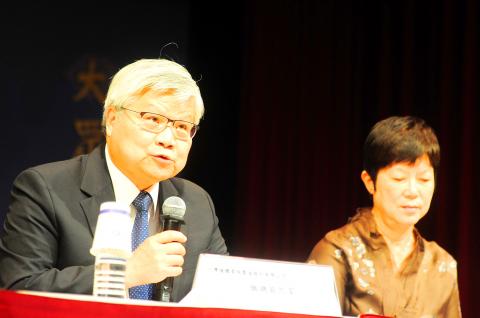Taiwan Semiconductor Manufacturing Co (TSMC, 台積電), the world’s largest contract chipmaker, yesterday said that it has fully recovered from a computer virus that struck the company on Friday evening last week.
Projected costs arising from the incident have been lowered to 2 percent of this quarter’s revenue, down from a previous forecast of 3 percent on Sunday, TSMC told a news conference at the Taiwan Stock Exchange in Taipei.
Gross margin would fall by 1 percentage point due to the cost of remedying the disruption to production, the company said.

Photo: Wang Yi-sung, Taipei Times
TSMC had previously forecast revenue of US$8.45 billion to US$8.55 billion for the third quarter, meaning losses would range from US$169 million to US$171 million, while gross margin is expected to be between 47 and 49 percent this quarter, down from its earlier guidance of 48 to 50 percent.
TSMC confirmed that the virus, which affected its fab tools, was a variant of the WannaCry ransomware worm.
TSMC said the incident occurred when new equipment was installed and connected to the company’s private network without first being scanned in an isolated system and cleared of viruses.
The WannaCry worm, which is known for its ability to spread rapidly, infected other fab tools at other plants via the company’s private network, TSMC said.
The advanced 7-nanometer fabs took the longest to recover from the virus, it said.
“The incident was caused entirely by a failure to follow protocol,” TSMC chief executive officer C.C. Wei (魏哲家) said, denying rumors it was a targeted cyberattack, the work of an internal agent or an act of sabotage via a USB drive.
Wei said the company has not received any ransom demands and none of its data were encrypted by the virus.
“We are in the process of revamping our security protocols, which would remove the possibility of such an error recurring,” Wei said, adding that the new system would be hardwired to block unverified nodes from connecting to the company’s private network.
“We do not expect these security upgrades to greatly affect operating expenses,” Wei said.
It is difficult to ensure that all of the company’s Windows 7 machines have been updated with the latest security patches, as the process requires collaboration with equipment suppliers and can only be performed during downtime, he said.
Wei declined to identify the fab tool that was initially affected, or its supplier, and whether TSMC would pursue legal recourse.
“We have installed tens of thousands of fab tools,” Wei said, adding that it is not normal for tools that have come straight out of the box to carry viruses.
“Our sole priority right now is to maintain clear communication with customers,” Wei said.
TSMC would not be exposed to breach of contract penalties from delayed shipments, chief financial officer Lora Ho (何麗梅) said.
Insurers only offer protection products for losses resulting from theft of customers’ personal data, a situation that does not apply to the TSMC incident, Ho said.
TSMC shares yesterday dipped 0.61 percent to NT$245.5 in Taipei trading.

PATENTS: MediaTek Inc said it would not comment on ongoing legal cases, but does not expect the legal action by Huawei to affect its business operations Smartphone integrated chips designer MediaTek Inc (聯發科) on Friday said that a lawsuit filed by Chinese smartphone brand Huawei Technologies Co (華為) over alleged patent infringements would have little impact on its operations. In an announcement posted on the Taiwan Stock Exchange, MediaTek said that it would not comment on an ongoing legal case. However, the company said that Huawei’s legal action would have little impact on its operations. MediaTek’s statement came after China-based PRIP Research said on Thursday that Huawei filed a lawsuit with a Chinese district court claiming that MediaTek infringed on its patents. The infringement mentioned in the lawsuit likely involved

Taipei is today suspending work, classes and its US$2.4 trillion stock market as Typhoon Gaemi approaches Taiwan with strong winds and heavy rain. The nation is not conducting securities, currency or fixed income trading, statements from its stock and currency exchanges said. Authorities had yesterday issued a warning that the storm could affect people on land and canceled some ship crossings and domestic flights. Taiwan Semiconductor Manufacturing Co (TSMC, 台積電) expects its local chipmaking fabs to maintain normal production, the company said in an e-mailed statement. The main chipmaker for Apple Inc and Nvidia Corp said it has activated routine typhoon alert

GROWTH: TSMC increased its projected revenue growth for this year to more than 25 percent, citing stronger-than-expected demand for AI devices and smartphones The Taiwan Institute of Economic Research (TIER, 台灣經濟研究院) yesterday raised its forecast for Taiwan’s GDP growth this year from 3.29 percent to 3.85 percent, as exports and private investment recovered faster than it predicted three months ago. The Taipei-based think tank also expects that Taiwan would see a 8.19 percent increase in exports this year, better than the 7.55 percent it projected in April, as US technology giants spent more money on artificial intelligence (AI) infrastructure and development. “There will be more AI servers going forward, but it remains to be seen if the momentum would extend to personal computers, smartphones and

Catastrophic computer outages caused by a software update from one company have once again exposed the dangers of global technological dependence on a handful of players, experts said on Friday. A flawed update sent out by the little-known security firm CrowdStrike Holdings Inc brought airlines, TV stations and myriad other aspects of daily life to a standstill. The outages affected companies or individuals that use CrowdStrike on the Microsoft Inc’s Windows platform. When they applied the update, the incompatible software crashed computers into a frozen state known as the “blue screen of death.” “Today CrowdStrike has become a household name, but not in